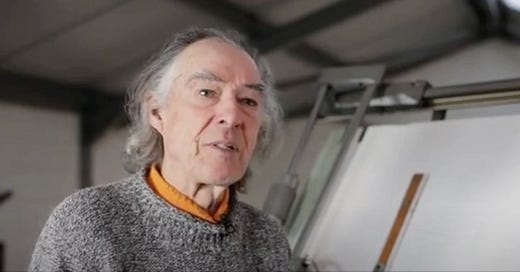I recently wrote an obituary for The Guardian, upon the death and so marking the life of the bicycle designer, Mike Burrows. As the obituary and most of the press coverage always centred, Mike was famous for designing the bicycle that Chris Boardman raced to an Olympic gold medal at the 1992 Barcelona Olympics.
It was of course an amazing bicycle and the design is credited by many, including Boardman, as central to his success both in a velodrome and subsequently in the Tour de France. Despite such a huge success obviously having always been the thing that made headlines, the thing that stands out in my memory of Mike was his singular niceness, and the enormous time of day he gave people even in their most basic understandings of bicycle design.
It was an interesting experience to write an obituary for a friend in a newspaper. Mike had character and accolades enough that he is easy to write about engagingly, but of course lots of more personal stuff didn’t fit well in there.
I didn’t mention the other friend who - before I first met Mike - said he was a bit like a cross between a bicycle designer and Leon Trotsky. The first time Mike and I met was on a train journey from Norwich to London, and I watched him, somewhat comically, lose his temper at someone using their mobile phone loudly in the quiet carriage of the train. It was an early introduction to someone who for the most part didn’t take himself or rules too seriously, but did worry that society was losing the conditions for meaningful communication and thought.
As with many people who love bicycles, he saw them as his own little way of improving the world a bit, specifically by making better bicycles that helped people either go fast or ease their daily lives. We worked together across a number of years on his project to develop a (really very good) cargo bicycle, and there was to him no difference between a speed machine such as Boardman’s, or one that could help a gardener move their tools with ease and no need of a petrol engine.
I think more than anything I am suddenly conscious of how committed to his values Mike was. He had a clear understanding of social value, what was important in bicycle design, and how that could better the world. With him no longer around I am left to consider firstly how enormously successful and important he was as a designer - in that way that it’s harder to see the place someone has in history while they are still alive. I am also conscious that his unswerving commitment to his values was to him a more important factor than certainly money, but even career advancement. He was, basically, just on a mission, with a deep sense of purpose that few people have and that many are willing to compromise or sell-out.
Most of all I’ve enjoyed remembering the time I was cycling through I think the Peak District, when my phone rang and saw that it was Mike, who I hadn’t seen for a while. He’d read Life Cycles, my first book and story of cycling around the world, which was newly out. I was pleasantly surprised and happy simply to hear that he’d read it, but delighted when he said he’d loved it. Then it was also just nice, and very Mike, to simply phone and say something like that and then we had a conversation and caught up. Again, it is one of those little things that take on a more defining place in a memory after a person is gone. I was happy to remember and revisit his review also attends the Amazon page to Life Cycles:
'This is a very inspiring tale that says a lot about the human race, its hopes and expectations, and there is even a bit about the bicycle, especially spoke breakages.'
The obituary is published here and has more on the story of the Olympic bicycle, Mike’s influence on global bicycle design when he was recruited for Giant after that Olympic win, the role of sculpture and even birdwatching in how Mike approached engineering, aerodynamics and ways of seeing.
I will miss him.





